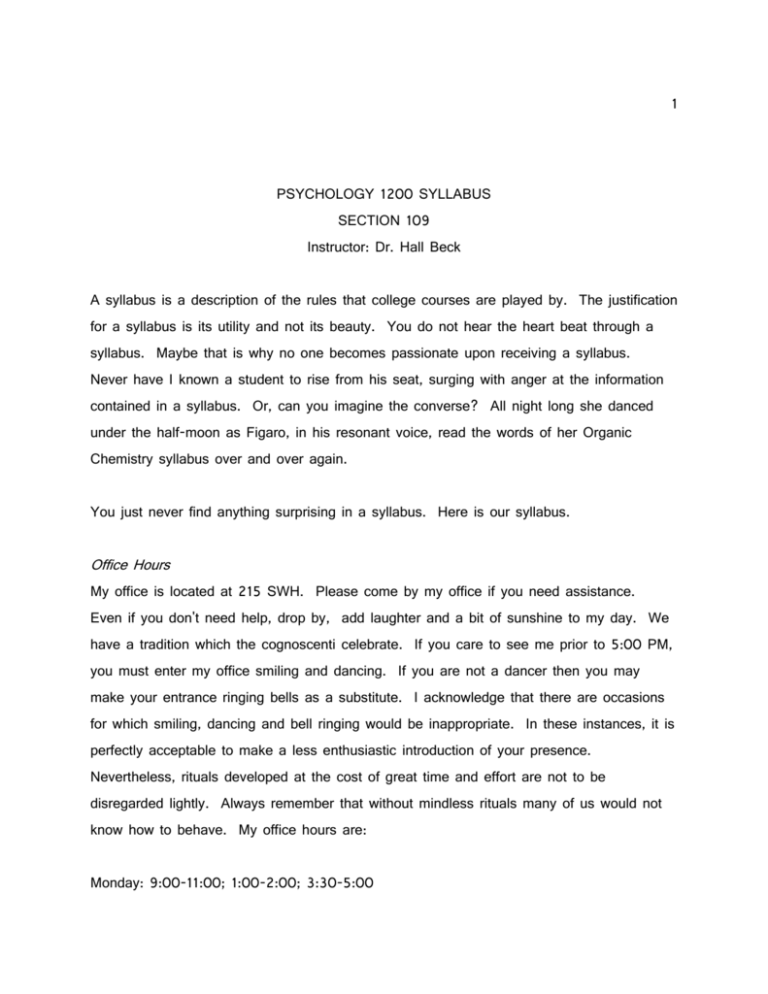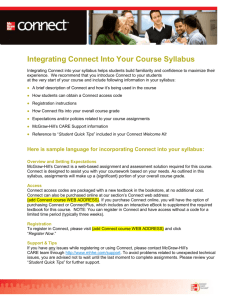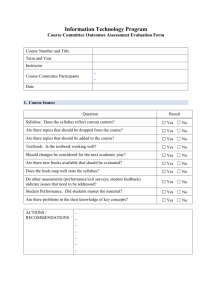PSYCHOLOGY 1200 SYLLABUS
advertisement

1 PSYCHOLOGY 1200 SYLLABUS SECTION 109 Instructor: Dr. Hall Beck A syllabus is a description of the rules that college courses are played by. The justification for a syllabus is its utility and not its beauty. You do not hear the heart beat through a syllabus. Maybe that is why no one becomes passionate upon receiving a syllabus. Never have I known a student to rise from his seat, surging with anger at the information contained in a syllabus. Or, can you imagine the converse? All night long she danced under the half-moon as Figaro, in his resonant voice, read the words of her Organic Chemistry syllabus over and over again. You just never find anything surprising in a syllabus. Here is our syllabus. Office Hours My office is located at 215 SWH. Please come by my office if you need assistance. Even if you don't need help, drop by, add laughter and a bit of sunshine to my day. We have a tradition which the cognoscenti celebrate. If you care to see me prior to 5:00 PM, you must enter my office smiling and dancing. If you are not a dancer then you may make your entrance ringing bells as a substitute. I acknowledge that there are occasions for which smiling, dancing and bell ringing would be inappropriate. In these instances, it is perfectly acceptable to make a less enthusiastic introduction of your presence. Nevertheless, rituals developed at the cost of great time and effort are not to be disregarded lightly. Always remember that without mindless rituals many of us would not know how to behave. My office hours are: Monday: 9:00-11:00; 1:00-2:00; 3:30-5:00 2 Tuesday: 10:00-11:00 Wednesday: 9:00-11:00; 3:30-5:00 Thursday: 10:00-11:00 Friday: No office hours Lectures, Text and Other Materials 1. Lectures (many lectures topics are summarized on the web) 2. Psychology: Themes and Variations (Weiten, 4th Edition) 3. Study Guide for textbook 4. Handouts prepared by the instructor 5. Readings placed on reserve 6. Materials available on the web Of Textbooks and Parrots Before Gutenberg's invention of the printing press, college professors were forced to lecture. There were two very good reasons that my medieval predecessors used the lecture method. Most students could not afford a book and many students could barely read. Much has changed since the fifteenth century, but universities still press on as if students cannot buy books and are illiterate. Why should a professor lecture on what most students can easily master from reading the text? I believe that the lecture practices in most courses are examples of thoughtless endeavors, which long ago lost their utility. I am just thankful that medieval faculty did not slap their students to keep them from freezing in virtually unheated buildings. Otherwise, we would probably be whacking our students in today's cozy classrooms and evaluating faculty to determine who are good and who are not so good whackers. 3 From my perspective, parrots make excellent pets but poor professors don=t. Therefore, we will not spend a minute covering straightforward material that is well described in our text. Class time is just too precious for wasteful repetition. Our text can be rented, but only from certain locations (e.g., bookstore). The bookstore staff and I have a curious custom. Every semester they ask me how many textbooks will be needed. I tell them. Then they order fewer books than I request. By the second day of class some student will inform me that there are no textbooks available. I call the bookstore and ask why aren't there enough books for my students? They say that they don't know, but it is unfortunate. To avoid this tragic fate, hurry to the bookstore before it is too late. Just think as you stand in an endless bookstore line, AIf I wasn=t here this whole place would be full of sweaty, tacky people.@ Such thoughts will give you the illusion that there is some valuable purpose that you are accomplishing. Lectures, the Web, and Laughter Lecture will cover a series of topics that do not fit well in the average textbook. You will find a series of study questions on the lecture component of our course, which are an important part of our class web site. You will come to love these study questions. In the past, the study questions have been the subject of poems. Several semesters ago, a student was so moved by the study questions that he wrote a song about them. I hope that you find the same degree of pleasure and excitement that I do in examining these issues that comprise the lecture component of the course. Many course assignments are available only on the web. In fact, you will not be able to perform successfully in our course unless you frequently access the web. Our society has 4 now reached a level of technological sophistication, such that no one can claim to be educated, who is not computer literate. It is a cruel, but undeniable fact, that people who are not well versed in computers are confined to live through a series of yesterdays.. As your instructor, it is my responsibility to prepare you for tomorrow. I would be negligent if I failed to consider valuable material that is on the web. Therefore, I have developed a web sight that is an integral part of our course. The material covered in our course is often both thought provoking and exhilarating. Psychology is such an exciting field of study that students frequently find that they are unable to control their emotions. Please attempt to refrain from demonstrations of extreme passion in class. Wallowing in the aisles is especially unseemly. However, despite the fact that I am a defender of the true propriety, I realize that there must always be time for laughter. Did you ever find yourself in this predicament? You smile at something said in class. The chuckle inside you builds into a full-fledged laugh. It explodes into a big "hee haw." You attempt to get control of yourself. You try not to think about it. It doesn't work. You put your hand over your mouth. You are gritting your teeth to withhold an outburst. Oh no! You can't stop thinking about it. Little tears are starting to roll down your face. Occasionally, a chortle erupts. Your lips sputter as you fight to hold it down. Your classmates are beginning to notice. They look at you, smiling, aware that you are on the verge of falling off the edge. Now, the professor focuses on you and says, "Is there some problem?" That's it!! That's it!! It's all over now. Uproarious laugh after uproarious laugh gushes forth. The class is staring, snickering at the hoot you have made of yourself. There is nothing else left to do. Your foolishness has halted the lecture. You struggle from your desk, mumbling; "I'm sorry," as one "ha" "ha" after another shakes your chest. Face flushed, one hand over your brow, you totter toward the door, convulsively bellowing guffaw upon guffaw. 5 The tragedy of this incident is not that the student has committed a social indiscretion. Our glorious animal heritage has given us all the capacity to laugh from the belly until we quiver. Society with its perverse politeness, has censored the heart out of us, replacing the wild whoop, with the tame "hmm" "hmm." Correctly restrained people wither, like petals on a sucked dry vine. Derivation of Points Most study guides that accompany college texts are a waste of time. Fortunately, ours is the exception; it is really good. The study guide will take you through the adventures and challenges that you will find in the textbook. One of my main goals is to make the objectives of this course as clear as possible. Students, who know the answers in the study guide, will do well in the Psychology 1200. So be a Star, learn those study questions. You will turn in your study guides prior to each examination. If you complete the assigned chapters, you will be awarded five points. If you do not finish all the items, you will receive zero points. The assignment cannot be handed in late under any circumstances. This includes your own demise. Please note that the study guide assignments are not extra credit. You are required to turn them in. There will be four multiple choice examinations of 100 points each. Think of these exams as four opportunities to behave in a heroic fashion and to demonstrate your excellence. Approximately, 50% of the information on the examinations will be covered in the lectures, but cannot be found in the textbook. Therefore, be sure to take complete notes and spend a significant amount of time reviewing the lecture component of our web site. 6 The final examination is not cumulative. I find it interesting that I am asked this question a number of times each semester, even though it is written in the syllabus. The date and time for the final are set by the University. Undoubtedly, this time will be inconvenient for some people (probably including your instructor). However, under no circumstances will the final be given at a different time. There is really no need to ask for an early or delayed final. All make-up examinations will be administered on the last day of regularly scheduled class. These make ups will be more difficult than the original tests. Wise students are known by the absence of certain behaviors. For example, clever students seldom put pencils up their nostrils, rarely forget to put their shirts on in the morning, and almost never attempt to walk on their knuckles. Wise students also do whatever they can to avoid taking make-up tests. All 1200 students will engage in research activity as part of the course. You can fulfill your research requirement in one of two ways. You can either serve as a participant in an investigation for a total of three hours or take a test on research related materials. There are a total of 25 points for research activity. Students who participate for a total of three hours will receive all 25 points. Please note that not a minute less than three hours is acceptable. If you accumulate less than three hours as a subject, you must take the research test. Students taking this test will receive points proportional to the items answered correctly. For instance, if you answer 80% of the items on the research test correctly you would obtain 20 points (20 = .8 x 25). The research test will be given at several times to be announced toward the end of the semester. 7 The next paragraph contains secret information that will only be helpful to males or females. If you are not a member of one of these groups, please skip this paragraph. The research activities provide easy points for the smart student, but are a pitfall for students who are not very good at planning ahead. Most of your classmates will want to participate in investigations for three hours instead of taking the research test. To accumulate three hours, you will need to be vigilant in checking to see when experiments are being performed. There is absolutely no guarantee that an investigation will be conducted when you want to be a participant. Some unfortunate student will earn two hours credit and be unable to find an investigation to gain the third hour. This poor soul will have to take the research test. Make sure that this does not happen to you. What occurs if you have less than three hours research credit and neglect to take the research test? In that case, you earn 0 of 25 research points, a good way to mess up a grade. I regret that I must now mention the issue of "no shows." No shows are persons suffering from bad form. It is bad form when you sign up for an investigation and do not appear for your appointment. Why is being a no show bad form? One reason is that by not showing up for a study you are keeping the investigator, who is some other student, from completing a course assignment. A second, equally important reason, is that you are depriving a classmate of the opportunity to earn research points. Third, by not showing up for a study, you are demonstrating that you do not feel that another student's time is important. Most of us have been "stood up" by someone before and we know how it feels. Universities are communities of scholars and for them to function successfully there must be mutual respect among students. No shows are a serious breach of the respect that we owe one another. The course grades of no shows will be reduced. It will be assumed that the first "no show" was beyond your control (e.g., sickness, you were attacked by angry neighbors, 8 etc.). Five research points will be deducted for the second no show and each no show thereafter. For example, if three no shows are reported, ten points will be subtracted from the 25 research points. There are no excused no shows. The first no show, for which you do not loose points, takes into account the possibility that some extraordinary event may keep you from keeping your appointment. A total of 15 attendance points can be obtained. Students are allowed three cuts. If you do not over cut, you will receive all 15 points. Five points will be subtracted for each over cut. Do not bring me a note from your mother, employer, or university staff member telling me that you will miss a class. We are adults. You are allowed sufficient cuts to account for illnesses, deaths in the family, mental health days, sports participation, writing the great American novel, pursuing the golden path to true enlightenment, etc. Thus, there will be NO EXCUSED ABSENCES. Use your cuts cleverly and earn some easy points. To be counted as attending you must sign the roll that will be passed around each day. It is your responsibility to sign the roll. Your neighbor may hide the roll in his shirt, jam it in his ear, make a paper hat out of it or impede you in some other villainous fashion. In all instances, it is your responsibility to get the roll and sign your name. You will be counted absent unless your name is on the roll. There will also be a computer assignment in which you must turn in 50 URLs related to material covered in our course. This activity will be described in detail in class. Big Chance for Extra Credit To learn about an extraordinary opportunity to excel in our course, check out the "Questing the Textbook" section under the "General Psychology Home Page." Essentially, here are the rules for the quest. 9 Read a chapter in the textbook not covered in our course. Take a 20 item test on one of the four "Quest Days" this semester. The amount of extra credit points depends on your performance on the quiz. A summary of the points and the means by which they are obtained is listed below: 1. 400 points from examinations (100 points each) 2. 30 points for Web Assignments 3. 15 points for attendance 4. 20 points for Study Questions (5 points each) 5. 25 points for research activity 10 Due Dates for Assignments September 10 Study Questions Chapter 3: Biological Basis of Behavior Chapter 4: Sensation and Perception September 17 Test 1: Chapter 3: Biological Basis of Behavior Chapter 4: Sensation and Perception Lecture Topics October 6 Study Questions Chapter 7: Human Memory Chapter 8: Language and Thought October 15 50 URLs October 20 Test 2 Chapter 7: Human Memory Chapter 8: Language and Thought Lecture Topics First Questing Opportunity November 5 Study Questions Chapter 10: Motivation and Emotion Chapter 11: Human Development Across the Life Span November 12 Test 3: Chapter 10: Motivation and Emotion Chapter 11: Human Development Across the Life Span Lecture Topics Second Questing Opportunity December 3 Study Questions 11 Chapter 14: Psychological Disorders Chapter 15: Psychotherapy Turn in Research Receipts ber 8 University Make-up Tests Final Exam: Chapter 14: Psychological Disorders Chapter 15: Psychotherapy Lecture Topics Welcome to the Drama!!







